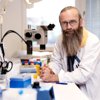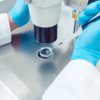Fritextsökning
Artiklar per år
Innehållstyper
-

This is the future location of the new national innovation cluster
Mölndal and Goco Health Innovation City will be the site of a new national innovation cluster for advanced therapies. The business community and the Swedish government are splitting the costs of the project, which is expected to produce new treatments
-

Rapid developments in AI – “All stakeholders are struggling to understand it”
Artificial intelligence is being discussed more and more, and developments in the field are moving rapidly. As the Swedish Medical Products Agency testifies, keeping up with developments is not easy.
-

Samuel Lagercrantz: The government’s performance in healthcare and life sciences so far
Since the change of government in Sweden, developments in the healthcare sector have shown promising signs, but the outlook in life sciences is less promising, writes Samuel Lagercrantz in an editorial.
-

New report: Fewer PhDs in life sciences
A new report from Vinnova suggests that competency returns in the life science sector are declining.
-

Uncertainty about the government’s life science work
The government’s national coordinator for life science, Jenni Nordborg, left her position almost four months ago. No one has yet succeeded her, and now questions are being raised both about the government’s plans for the office and the Swedish life science strategy.
-

Conference on Alzheimer’s reveals several advances in the field
In Gothenburg, Sweden, researchers and pharmaceutical companies from all over the world gathered to discuss one specific issue – neurological diseases. Life Science Sweden has talked to some of those that attended the conference.
-

Han föreslås ta över klubban i Boule
Torben Jørgensen föreslås av valberedningen att bli ny ordförande i Boule Diagnostics.
-

Vinnova is going to establish a new innovation cluster
Vinnova, the Swedish Agency for Innovation Systems, has been commissioned by the government to establish a national innovation cluster for advanced medicines.
-

Meeting with focus on South Korea and Japan’s life sciences
Large, complex and exciting – this is how Britta Stenson, Business Sweden, describes the life science markets of Japan and South Korea, which took centre stage during a webcast seminar.
-

Han är Novocures nya nordiska marknadschef
Novocure har anställt Jonas Nylander som ny nordisk marknadschef.
-

Major advances in IVF labs in the last few decades
Since the introduction of in vitro fertilisation several decades ago, many developments have been made in the field, and the main part of that development has taken place in the lab.
-

“I am driven by the desire to develop a product that can be sold worldwide”
Ranked number one in the world by the WHO in diarrhoea research and soon in phase III studies for its vaccine candidate – Scandinavian Biopharma is rushing forward in the pursuit of the world’s first ETEC vaccine. Meet the company’s CEO Björn Sjöstrand.
-

The Swedish National Board of Health and Welfare rejects prioritising andrology as a speciality
Male infertility can be linked to a shorter lifespan and several severe diseases, but when couples who want children are examined, the focus is on the woman. Experts in the field claim that andrology needs to become a speciality in Sweden to increase
-

“An entire industry is about to be wiped out”
According to Jennie Ekbeck, CEO of Umeå Biotech Incubators, Sweden risks not having any small diagnostic companies left in five years.
-

How critical are the “Spermageddon” reports? – Researchers call for action
A much talked about meta-study indicates that sperm concentration in men’s seminal fluid has halved in 40 years. Experts in andrology that Life Science Sweden speaks to believe that the results must be taken seriously, and call for action from the Swedish authorities.
-

Rapid development in blood analysis – “Sweden is leading the race”
Thousands of analytical tests using just one single drop of blood. What was revealed as a hoax just a few years ago is now a reality, according to KTH professor and serial entrepreneur Mathias Uhlén.
-

Column: ”Authentic leadership and clear mandates pave the way for more female CEOs”
”I believe that the aspect of having clear mandates and titles on the one hand and women progressing into top positions must be explored further”, Helena Strigård writes in a column.
-

Uppsalabolag köper brittiskt företag i miljardaffär – och får nya storägare
Bioteknikbolaget Biotage har tecknat avtal om att förvärva brittiska Astrea Bioseperations i en affär värd över två miljarder kronor. Betalning sker i aktier till säljaren, amerikanska Gamma Biosciences, som därmed blir största ägare i Biotage.
-

Individual DNA passport could result in fewer drug side effects
You may be required to show a DNA passport when you pick up medicines at the pharmacy in the future. According to a new study, patients might suffer 30% fewer side effects if the drug treatment is adapted to their genes.
-

Claims of life science companies fleeing abroad is a myth according to survey
The claim that life science companies are moving abroad is exaggerated. In fact, only a tiny percentage is leaving the country, according to a survey.
-

Precision medicine centre: “Extensive activity on several fronts”
Two years ago, the Karolinska Institutet and the Karolinska University Hospital announced that they would jointly launch the Precision Medicine Centre. Medtech Magazine called Anna Wedell, who is heading the work, to find out…
-

Column: ”We need to exploit the benefits of the regulations“
You don’t need to search long on the Internet to find lists of the most innovative countries with Sweden ranking at the top. Sweden generally offers good conditions for growing new solutions, but it is also becoming increasingly clear that we are challenged in one area – regulations, writes Björn Arvidsson in a column.
-

”Vi måste säkerställa att alla medborgare får tillgång till nya behandlingar”
Idag är behandlingar som gavs för två år sedan redan obsoleta och inget tyder på att vi nått en platå vad gäller nya terapier. Det anser Läkemedelsverkets generaldirektör Björn Eriksson som talar på den pågående konferensen Framtidens Hälso & Sjukvård.
-

He saved lives with his theories – was ostracised and ended up in a mental hospital
Hungarian doctor Ignaz Semmelweis (1818-1865) undoubtedly possessed plenty of persistence, diligence and sound reasoning skills – but he was hardly blessed with luck and timing.